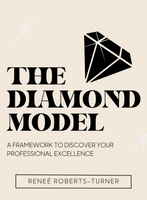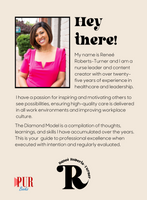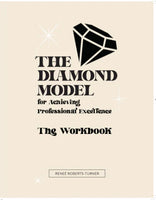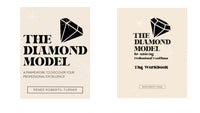The Diamond Model: Achieving Professional Excellence
In 2010, I completed my research for my doctoral degree with a quantitative study that focused on the influence of perceived leadership characteristics on nurse satisfaction. The findings of the study has been the foundation for my professional interests ever since1. The results reiterated the importance of leadership competencies and how these competencies or perceived behaviors impact nurses' satisfaction. As leaders, we must be aware of how our actions, interactions, verbal and nonverbal cues come across to others.
For nurses to be active members of Nursing Excellence, they must have Professional Excellence. Nursing excellence is the excellence of the nursing function in a hospital, for example, of or the entire nursing profession; Professional excellence is the excellence of an individual nurse.
There are many references to collective nursing excellence:
- helping nurses make their optimal contribution to patients and their work environments and the recognition of their effort.2
- emphasizes teamwork, collaboration, innovation, and continuous improvement in healthcare delivery.
The American Nurses Credentialing Center (ANCC) Magnet Recognition Program is a blueprint for organizations to advance nursing excellence. The ANCC Magnet Model—which includes 5 components, Transformational Leadership, Structural Empowerment, Exemplary Professional Practice, New Knowledge and Innovation and Empirical Outcomes—is a framework for organizations to assess and strengthen the Professional Practice of Nursing.4
Both Nursing Excellence and Professional Excellence are key concepts and foundational to the professional practice of nursing. However, what does not exist is a model or framework to support the process of intentionally crafting Personal and Professional Excellence.
Over the years, I've helped other nurses work through these various components of the Diamond Model and realized that as you start to put them together, you create a living depiction of an individual’s Professional Excellence.
Thus, I created the Diamond Model to support individuals as they work through and define their Professional Excellence. This model helps eliminate some ambiguity related to defining individual Professional Excellence. Adopting this framework will allow one to be a more effective participant in advancing their Professional Excellence by personally addressing the model's critical components.
AUTHOR: RENEE ROBERTS-TURNER
ISBN: 979-8-218-24337-1
5.5 x 7.5 inches
Paperback
60 pages
Table of Contents:
Introduction
Chapter One. Personal Excellence
Chapter Two. Leadership
Chapter Three. Mentors
Chapter Four. Education & Development
Chapter Five. Evidence & Practice
Chapter Six. Networking & Relationships
Chapter Seven. Goals & Outcomes




Text Column
These text columns are great for showing off features or policies (such as shipping or return policy). Attach an image or an icon for more visual interest.
Read more →Text Column
These text columns are great for showing off features or policies (such as shipping or return policy). Attach an image or an icon for more visual interest.
Read more →Text Column
These text columns are great for showing off features or policies (such as shipping or return policy). Attach an image or an icon for more visual interest.
Read more →


